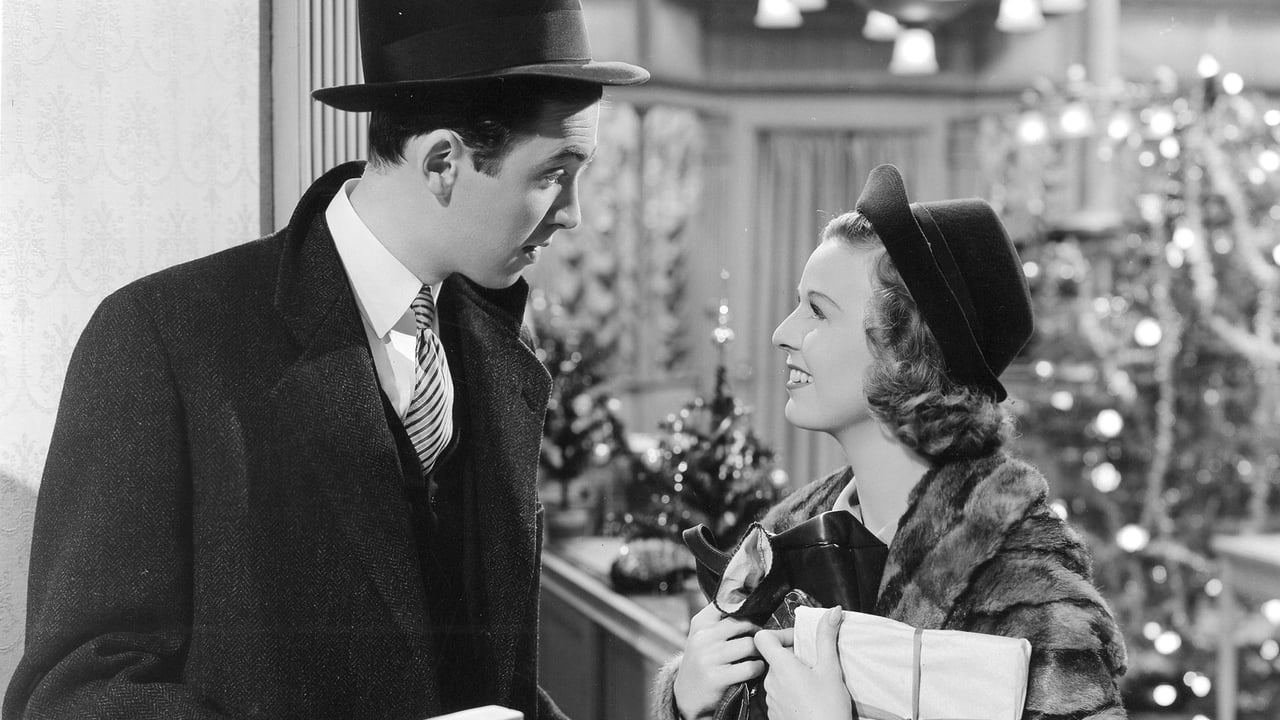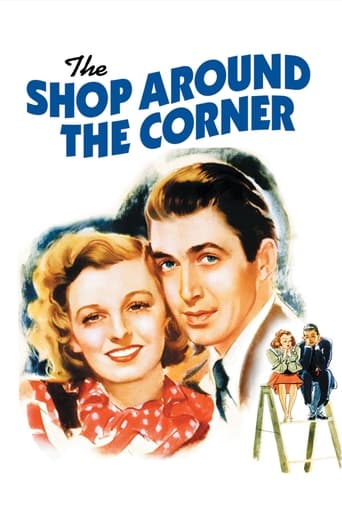Tyreece Hulme
One of the best movies of the year! Incredible from the beginning to the end.
Benas Mcloughlin
Worth seeing just to witness how winsome it is.
Matylda Swan
It is a whirlwind of delight --- attractive actors, stunning couture, spectacular sets and outrageous parties.
Nicole
I enjoyed watching this film and would recommend other to give it a try , (as I am) but this movie, although enjoyable to watch due to the better than average acting fails to add anything new to its storyline that is all too familiar to these types of movies.
Kirpianuscus
The perfect film for Christmas. for its nuances. for charming performances. for James Steward in his special way to build the role. for family atmosphere. for the small detail than, each you see it, it seems different. the motif - it is one of films who could be defined as ...perfect. the atmosphere, the story, the Capra flavour, the science to use each actor in the best manner for create a small universe, far to be perfect, but seductive, nice and lovely. a film about love and essence of love. beautiful. or just admirable.
MisterWhiplash
It's easy to see romantic comedies containing ridiculous premises - we've had them now with Hollywood for decades - but like so much in cinema what has to work is the execution. You could have a meet cute that involves two people meeting by accidentally bumping into each other and striking up a conversation about their dogs in 2016 (sound familiar at all?) and it could be a terrific, entertaining, engaging and artistically driven film if there's some heart behind it, if we can get behind the characters, and the actors and director are sympatico with how to add some humanity to the situation. Ernst Lubitch and Margararet Sullivan and Jimmy Stewart have that with Shop Around the Corner, and that's what counts.Hell, the movie may sound familiar because it IS now remade (1998's You've Got Mail): Klara gets a job through showing off a skill (apparently it is one) to sell an object like a music box to a newcomer to the owner of Matuschek's (Frank Morgan, Oz's Wizard in an apt role), and yet this doesn't sit well with Alfred, who can't stand the music box (mpph, he says, what if someone smokes 20 cigarettes a day, it'll get in their heads!) or maybe even her for that matter. But his animosity is also met by her's, and yet unbeknownst to each other they have a correspondence going with people they find "wonderful" and arrange some months after - it cuts ahead in time, it's fine - to finally meet. And of course they are writing to one another.So it's cute, it's precious maybe, but everything in this script is realistically drawn by Samson Raphaelson (from a play, and apparently it's why this takes place in Hungary for some reason or another). That is to say, no one really acts too much like an idiot (a common problem with today's rom-coms, when they do some out but you know what I mean), and there's even an element of sadness to the film, of things not working out for people and betrayal and mistrust. In a way it's as much about trust and belief in others as it is about love if not more-so, and a lot of this comes out in a sub-plot that makes the film as good as it is.What happens with this sub-plot? Well, Mr Matuschek is becoming more brusque with his employees as time goes on - he cares that things get sold and that his employees do things like stay after, just ONCE per year, to help set things up for Christmas - and it leads to an argument with Alfred that later in the same day results in Alfred being let go from the job. This isn't the kind of scene many might expect when coming to a screwball romantic comedy (and this isn't really screwball, but you also know what I mean). It's dealt with in a degree of reality, and that there's sadness to what's happened to Alfred and how Stewart and Morgan act the scene together when the boss tells him employee he's fired it's not something explosive or melodramatic, it's subtle and it cuts deep since we know there's this connection between the two going back years (Alfred being the oldest employee he has).And then there's Matuschek's marriage, which drives a lot of this sub-plot conflict, and it's not silly or meant for laughs. If anything the movie may lack some laughs in places, but there are enough that it satisfies as a comedy, if not *as* much as Trouble in Paradise or To Be or Not to Be (very different movies but also films dealing with romance and status in society). I think the real juggling act for Lubitsch here is to have this light tone, to have the kind of "ooh, I can't STAND you!" dynamic that Stewart and Sullivan have here - and I think Stewart is a better fit than in the other 1940 mega Rom-Com, The Philadelphia Story, which is possibly more entertaining overall but not as strong as a story - and there's that part of it, and then there's the dramatic parts. This is a business we're meant to take seriously as a place that Matuschek's made for his employees to feel like they're at home (with one exception, who I won't mention here but is revealed to be the sort of "heel" of the movie), and when this old man gets drama in his life it tears him apart despite his work life.I wish I could put into words what makes this movie so special, and I think that it's *because* that Lubitsch has this plot contrivance involving these two people and their correspondence, and how Alfred finds out first that Klara has been writing to him all along and he doesn't mention anything about it when he goes into that restaurant (only to let the tension and words and verbal aggression continue), that he has something to work with. It's fun to see this push and pull between the two, but then also how they naturally, mostly from Klara to Alfred, build attraction over the course of the story.So by the time it gets to that ending, it's not corny or cheesy, it's earned and emotional and it feels like a fable come true in some odd way. The Shop Around the Corner both reflects the economic uncertainty of the period (remember this is still pre WW2 and though it's Europe I'm sure it wasn't so different as in the US far as lack of work goes) and fulfills a good part of drama for how characters see one another and how misconceptions can drive things to a tipping point (and will one go over or not), and then also how a sweet romance can be concocted amid all of this. 9.5/10
SimonJack
It's too bad that more of Miklós László's plays haven't been translated into English. The few that are from the Hungarian-born playwright have made wonderful plays and films. One has been copied and revised a number of times for Broadway production, TV musicals and films. "The Shop Around the Corner" is the original film version, true to the setting. The most recent that modern audiences will recognize is "You've Got Mail" from 1998. Billed as a comedy first, this movie shows us a slice of life of working people in 1930s Budapest, Hungary. Europe was also a part of the worldwide depression that had begun in the U.S. Even as the economies began to improve, jobs were scarce and hard to come by. That sets the stage for this story that has a wonderful mix of light comedy with romance and drama. It's a very good study of people. The entire cast shine in this movie. James Stewart as Mr. Kralik and Margaret Sullavan as Miss Novak play off each other splendidly. Sullavan especially does a wonderful job as Novak subtly comes around after noticing the changes in Kralik. Felix Bressart is perfect as Pirovitch. This wonderful supporting actor had a fine career in film before he died at age 57 from leukemia. Frank Morgan's performance as Mr. Matuschek is also worth noting. He portrayed a worrisome man with something on his mind exceptionally well. As I watched this movie again recently, I remember being curious about the monetary units in the story. We see the cash register tills ring up pengos, and Matuschek talks about the how many pengos they take in. I was a stamp collector for years growing up, and got to know a lot of world geography and other things from those stamps. Among them were monetary systems, capitals, famous historical figures, etc. For instance, I knew that Magyar referred to an area and people of Hungary, and I had stamps in denominations of korona. But the pengo had me stumped, so I just looked it up. The pengo replaced the korona as the basic monetary unit of Hungary from 1927 to 1946, when it was replaced by the forint. It was the equivalent of 100 fillers, making it similar to the U.S. dollar as the form of currency. Encyclopedias explain that the pengo was part of the stabilization program for Europe following WW I. It lasted only 20 years and apparently had the worst hyperinflation of all time. I don't know what the value of the pengo was in U.S. dollars then. The Hungarian Florint for several years now has ranged between one-third and one-half a U.S. cent. At the time this film was made, the pengo was issued only in denominations of 10-, 5- and 2-pengo bills. Minted coins included 1, 2, 10, 20 and 50 filler, and three in pengo amounts of 1, 2 and 5. The front of the 10-pengo bill had a picture of Mary holding the baby Jesus on the left, and a female model bust on the right. The reverse had the picture of a statue of King Stephen astride a horse. The story takes place around the holiday season. "Shop Around the Corner" makes a nice film to add to one's Christmas collection for annual viewing.
Raya Jacob
This was my first-ever Jimmy Stewart romance film, and now I'm interested to watch his other films, too.I was pleasantly surprised to find the comedic dialogue well-paced, and the romantic portions charming without being cheesy. Very 'modern' for a 1940 film. It's like watching a stage play.The unusual setting (early 1900s Budapest) is an added interest, and the beautifully crisp black-and-white of the film focuses attention on the essentials of each scene.The thing I enjoyed best, though, is Stewart's remarkable screen presence; he has an "earnest-but-not-a-pushover" charm that made me want to cheer him on.

